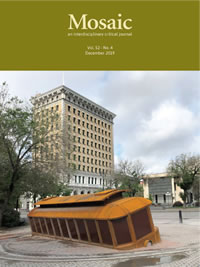Issue 52.4
Overview

General Issue
Published: December 2019
View the issue introduction or see the issue summary and contents below.
9 essays, totalling 184 pages
$24.95 CAD
This general issue features essays on rhetoric and resistance, language and translation, tolerance, Ruth Ozeki’s A Tale for the Time Being, resilience, relationality, Rancière and Derrida’s textual relationship, and two essays on Hamlet—one which explores Hamlet in relation to Freud and self-authorship, and the other which posits tragic foundationalism as Hamlet’s hamartia.
Resistances to Rhetoric: Jakobson and GenetteAndrzej Warminski Taking its point of departure from Paul de Man’s "The Resistance to Theory," this essay would demonstrate that a certain resistance to the rhetorical or tropological dimensions of language inhabits the work even of two theorists—Jakobson and Genette—keenly aware of this dimension and who explicitly put it to work in their theoretical projects. | |
Tell My Story: Freud, Hamlet, and the Burdens of Self-AuthorshipAndrew Barnaby Aiming to put Freud’s writings in dialogue with Shakespeare’s Hamlet, this essay considers the burden of speaking for oneself as the burden of what it means to call oneself into being against the precedence—the authority and priority—of another. | |
Between Towers and Giants—: Kafka, Celan, and Derrida in Babel and PragueRebecca Haubrich Arguing a kinship between the Tower of Babel and the golem, which roots in language’s dilatable structure, this essay begins with a comparison of retellings by Kafka and Celan. Relating them to Derrida’s consideration of the relation between literature and law, secondly it posits language’s dilatability as the foundation of interpretation. | |
Tolerance, Secularism, Multiculturalism: Charlie Hebdo and MausAdina Balint and Patrick Imbert This essay draws on socio-political views on tolerance and theories of multiculturalism to explore the dynamics of freedom of expression, secularism, and resentment in the Charlie Hebdo event and in Art Spiegelman’s Maus, emphasizing the irreducible impact of literature, culture, and life experiences on the cultivation of democratic values. | |
Japanese Melancholy and the Ethics of Concealment in Ruth Ozeki’s A Tale for the Time BeingAndrew Kim This essay approaches Ruth Ozeki’s novel A Tale for the Time Being as an ethnographic text of twenty-first century Japan and the quasi-events that constitute its becoming. The novel is a melancholy speculation of Japan’s meaning within a geologic longue durée of human suffering and unsustainability. | |
Tragic FoundationalismJeffrey R. Wilson This essay puts the modern philosopher Alain Badiou’s theory of foundationalism into dialogue with the early modern playwright William Shakespeare’s Hamlet. Doing so reveals a new candidate for Hamlet’s traditionally hard-to-define hamartia—his “tragic mistake”—while providing an opportunity to theorize the notion of tragic foundationalism. | |
The Myth of Resilience: Ajax UndressedEric Bronson In trauma studies, resilience refers to one’s ability to confront, work through, and rise above traumatic experiences. Sophocles encourages us to rethink our admiration for such heroic efforts. In Sophocles’s Ajax, it isn’t modern conceptions of resilience, but a stripped-down compassion that helps sheathe our most destructive thoughts. | |
Do You See It Too? Relationality in Pacific Northwest Sea Serpent LoreMatthew Teorey Arguing that the reactions to sea serpent stories reveal some key differences in the world-views and lifeways of Indigenous and non-Indigenous residents of the Pacific Northwest, this essay examines how the epistemology of relationality contests hierarchical binaries, attempted cultural erasure, and ownership of place. | |
Ghosts, Fictions, and the Rule of Chance: Rancière on Derrida’s DisseminationJen Hui Bon Hoa This essay examines Rancière’s debt to and critique of deconstruction. Focusing on his largely tacit engagement with Dissemination, I argue that Rancière replicates much of Derrida’s thought on writing and politics but ultimately disputes his definition of chance and, correspondingly, of democracy as the rule of chance. |